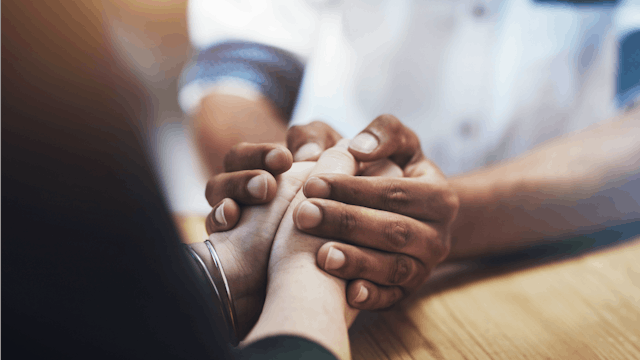This Is Why It's Important To Talk About Miscarriage

My OBGYN waiting room, which was once a space where I happily awaited hearing my baby’s heartbeat, now became a ticking time bomb to my doctor telling me what I already knew inside: I had lost my baby.
There are myriad things that suck about miscarriage. Its physically horrible, emotionally draining, mentally unbearable, and turns your world upside down. But other mamas in my life (including my own mother) who opened up to me and told me about their experiences demonstrated a breathtaking sense of bravery that shouldn’t go unnoticed about the resiliency that is female.
It wasn’t until after I lost my baby at 10 weeks and confided in my friends and loved ones about my experience that I realized nearly everyone I talked to knew someone who went through this heartbreaking ordeal. But, by far, the most beautiful thing to come from this were the conversations I had with other women: the women who hugged me, cried with me, and and supported me.
According to the American Pregnancy Association, “Miscarriage is the most common type of pregnancy loss, according to the American College of Obstetricians and Gynecologists (ACOG). Studies reveal that anywhere from 10-25% of all clinically recognized pregnancies will end in miscarriage.” With nearly a quarter of women suffering from this loss, why is it that so many of us feel so incredibly alone when it happens?
With such a painful subject, it can be hard to open up about your personal experience — but the most difficult conversations are the most important. The more we open up about our heartbreaks, the more we can support other mothers who may be suffering in silence.
After a certain period of time during your first trimester, your growing child becomes a reality and it starts to feel safe to peruse Pinterest and start daydreaming of nursery designs. You may have even gone shopping already, strolling the aisles and buying a few things, tucking them away in a closet or drawer.
When I lost my child at 10 weeks, I had already figured out what my announcement would look like as I imagined revealing our little presence to the rest of the world. And then the rug was suddenly whipped from beneath my feet. A future I had begun to visualize was suddenly erased before I could even wrap my head around what was happening, and a family of five slipped through my fingers.
The social media algorithms became absolute torture. Only a few weeks prior, I was clicking through a zillion ads and articles daydreaming about the tiny person growing in my belly — now they nothing but a constant and incredibly painful reminder of what could have been.
The little face I saw only once at the ultrasound has now transformed into a tiny silhouette I can only imagine in my mind, chasing after my other children in the yard, never having the chance to leave footprints behind.
After ending up in the hospital from a miscarriage gone completely awry, what was once a very personal and heartbreaking experience had become imminently public. Having to explain my presence at the ER to complete strangers was difficult each time I had to page for help. But it did force me to address one of the most painful moments in my life, open up to those who were concerned for my health and well-being, and begin the conversation I needed to start walking the path of healing my heart.
Your body heals slowly, your head even slower, and your heart may never heal completely. But for any mama reading this who has had a miscarriage please remember: you are not alone.
I feel your pain as you may occasionally bring yourself to touch the few new baby items you bought, bittersweet gifts that may bring you to tears.
I cheer you on as you sincerely congratulate the other women around you who are pregnant or are just beginning their motherhood journey, no matter how much it stings inside.
I congratulate your strength as you wake up each day and continue to heal.
You are not alone, and many, many other women around you can relate to you, support you, and feel your pain as you look down at your overwhelmingly empty lap.
The village that is motherhood is one of the most beautiful things about being a woman.
This article was originally published on